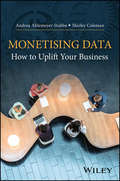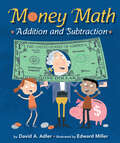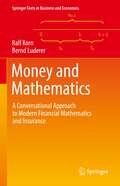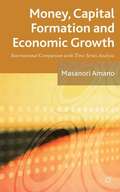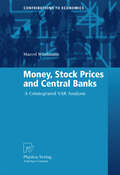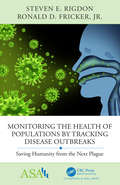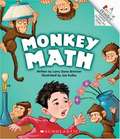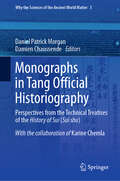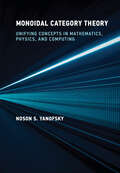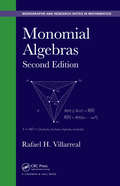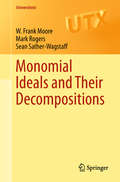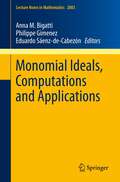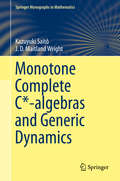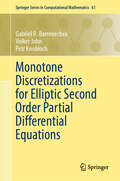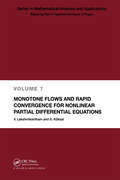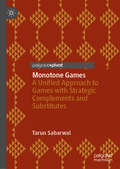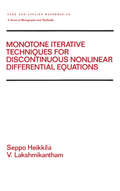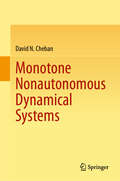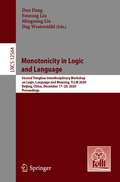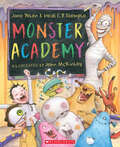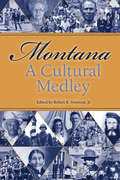- Table View
- List View
Monetising Data: How to Uplift Your Business
by Shirley Coleman Andrea Ahlemeyer-StubbePractical guide for deriving insight and commercial gain from data Monetising Data offers a practical guide for anyone working with commercial data but lacking deep knowledge of statistics or data mining. The authors — noted experts in the field — show how to generate extra benefit from data already collected and how to use it to solve business problems. In accessible terms, the book details ways to extract data to enhance business practices and offers information on important topics such as data handling and management, statistical methods, graphics and business issues. The text presents a wide range of illustrative case studies and examples to demonstrate how to adapt the ideas towards monetisation, no matter the size or type of organisation. The authors explain on a general level how data is cleaned and matched between data sets and how we learn from data analytics to address vital business issues. The book clearly shows how to analyse and organise data to identify people and follow and interact with them through the customer lifecycle. Monetising Data is an important resource: Focuses on different business scenarios and opportunities to turn data into value Gives an overview on how to store, manage and maintain data Presents mechanisms for using knowledge from data analytics to improve the business and increase profits Includes practical suggestions for identifying business issues from the data Written for everyone engaged in improving the performance of a company, including managers and students, Monetising Data is an essential guide for understanding and using data to enrich business practice.
Money Math: Addition and Subtraction
by David A. AdlerThis primer on money will change how you see addition and subtraction.What can a handful of coins get you? Well, it depends on how many you've got. . . . and what they are. In this fun introduction to American currency, a variety of past presidents introduce themselves and their denominations. You'll learn who's on each coin and bill, and what they're worth-- and how many of one it takes to add up to another. Dollars, cents, and decimals are explained in accessible, kid-friendly language, with tons of examples and try-it-yourself problems and activities. The mathematical concepts of addition, subtraction, multiplication and division become hands-on in this innovative math book from trusted duo David A. Adler and Edward Miller, whose award-winning collaborations have been helping students tackle complicated problems for years. After reading Money Math, kids will be confident with their pocket change!A Junior Library Guild Selection
Money and Mathematics: A Conversational Approach to Modern Financial Mathematics and Insurance (Springer Texts in Business and Economics)
by Bernd Luderer Ralf KornThis book follows a conversational approach in five dozen stories that provide an insight into the colorful world of financial mathematics and financial markets in a relaxed, accessible and entertaining form. The authors present various topics such as returns, real interest rates, present values, arbitrage, replication, options, swaps, the Black-Scholes formula and many more. The readers will learn how to discover, analyze, and deal with the many financial mathematical decisions the daily routine constantly demands. The book covers a wide field in terms of scope and thematic diversity. Numerous stories are inspired by the fields of deterministic financial mathematics, option valuation, portfolio optimization and actuarial mathematics. The book also contains a collection of basic concepts and formulas of financial mathematics and of probability theory. Thus, also readers new to the subject will be provided with all the necessary information to verify the calculations.
Money, Capital Formation and Economic Growth
by Masanori AmanoThis book proposes new methods of detecting causality among several dynamic variables and of estimating divisions of nominal income changes into changes in output and prices. Amano builds on established traditions of macro-dynamics and the theories of Keynes and Freidman, while providing innovative perspectives and important policy implications.
Money, Stock Prices and Central Banks: A Cointegrated VAR Analysis
by Marcel WiedmannThis contribution applies the cointegrated vector autoregressive (CVAR) model to analyze the long-run behavior and short-run dynamics of stock markets across five developed and three emerging economies. The main objective is to check whether liquidity conditions play an important role in stock market developments. As an innovation, liquidity conditions enter the analysis from three angles: in the form of a broad monetary aggregate, the interbank overnight rate and net capital flows, which represent the share of global liquidity that arrives in the respective country. A second aim is to understand whether central banks are able to influence the stock market.
MoneyWise Mabel's Bursting Bank
by Kalee BoisvertWhat should Mabel do now that her piggybank is full to the brim? Buy lots of candy? Spend it all on that toy she&’s been eyeing? Finally get that unicorn sprinkler that sprays water from its horn?When Mabel pulls her piggy bank out from under the bed, it&’s stuffed. She can&’t fit one more coin inside–Piggy is bursting!What should Mabel do with all that money? Buy candy? Toys? Games!? Mabel&’s so excited that her bed becomes a trampoline and she wants to spend it all. But then her mother explains that money doesn&’t have to burn a hole in your pocket—a lesson that sends Mabel on a journey to learn what it means to become &“moneywise.&” Follow her as she takes her first steps to independence by opening a bank account!Teach your school-aged kids fundamentals about money management with this approachable, fun, and charming debut from Kalee Boisvert, full of colorful illustrations and easy-to-understand concepts.
Moneyball (Movie Tie-in Edition) (Movie Tie-in Editions)
by Michael Lewis"You need know absolutely nothing about baseball to appreciate the wit, snap, economy . . . and incisiveness of [Moneyball]. Lewis has hit another one out of the park." --Janet Maslin, New York Times Billy Beane, the Oakland A's general manager, is leading a revolution. Reinventing his team on a budget, he needs to outsmart the richer teams. He signs undervalued players whom the scouts consider flawed but who have a knack for getting on base, scoring runs, and winning games. Moneyball is a quest for the secret of success in baseball and a tale of the search for new baseball knowledge--insights that will give the little guy who is willing to discard old wisdom the edge over big money.
Moneyball: The Art of Winning an Unfair Game
by Michael LewisMichael Lewis’s instant classic may be “the most influential book on sports ever written” (People), but “you need know absolutely nothing about baseball to appreciate the wit, snap, economy and incisiveness of [Lewis’s] thoughts about it” (Janet Maslin, New York Times). One of GQ's 50 Best Books of Literary Journalism of the 21st Century Just before the 2002 season opens, the Oakland Athletics must relinquish its three most prominent (and expensive) players and is written off by just about everyone—but then comes roaring back to challenge the American League record for consecutive wins. How did one of the poorest teams in baseball win so many games? In a quest to discover the answer, Michael Lewis delivers not only “the single most influential baseball book ever” (Rob Neyer, Slate) but also what “may be the best book ever written on business” (Weekly Standard). Lewis first looks to all the logical places—the front offices of major league teams, the coaches, the minds of brilliant players—but discovers the real jackpot is a cache of numbers?numbers!?collected over the years by a strange brotherhood of amateur baseball enthusiasts: software engineers, statisticians, Wall Street analysts, lawyers, and physics professors. What these numbers prove is that the traditional yardsticks of success for players and teams are fatally flawed. Even the box score misleads us by ignoring the crucial importance of the humble base-on-balls. This information had been around for years, and nobody inside Major League Baseball paid it any mind. And then came Billy Beane, general manager of the Oakland Athletics. He paid attention to those numbers?with the second-lowest payroll in baseball at his disposal he had to?to conduct an astonishing experiment in finding and fielding a team that nobody else wanted. In a narrative full of fabulous characters and brilliant excursions into the unexpected, Michael Lewis shows us how and why the new baseball knowledge works. He also sets up a sly and hilarious morality tale: Big Money, like Goliath, is always supposed to win . . . how can we not cheer for David?
Monitoring the Health of Populations by Tracking Disease Outbreaks: Saving Humanity from the Next Plague (ASA-CRC Series on Statistical Reasoning in Science and Society)
by Steven E Rigdon Ronald D. Fricker, Jr.With COVID-19 sweeping across the globe with near impunity, it is thwarting governments and health organizations efforts to contain it. Not since the 1918 Spanish Flu have citizens of developed countries experienced such a large-scale disease outbreak that is having devastating health and economic impacts. One reason such outbreaks are not more common has been the success of the public health community, including epidemiologists and biostatisticians, in identifying and then mitigating or eliminating the outbreaks. Monitoring the Health of Populations by Tracking Disease Outbreaks: Saving Humanity from the Next Plague is the story of the application of statistics for disease detection and tracking. The work of public health officials often crucially depends on statistical methods to help discern whether an outbreak may be occurring and, if there is sufficient evidence of an outbreak, then to locate and track it. Statisticians also help collect critical information, and they analyze the resulting data to help investigators zero in on a cause for a disease. With the recent outbreaks of diseases such as swine and bird flu, Ebola, and now COVID-19, the role that epidemiologists and biostatisticians play is more important than ever. Features: · Discusses the crucial roles of statistics in early disease detection. · Outlines the concepts and methods of disease surveillance. · Covers surveillance techniques for communicable diseases like Zika and chronic diseases such as cancer. · Gives real world examples of disease investigations including smallpox, syphilis, anthrax, yellow fever, and microcephaly (and its relationship to the Zika virus). Via the process of identifying an outbreak, finding its cause, and developing a plan to prevent its reoccurrence, this book tells the story of how medical and public health professionals use statistics to help mitigate the effects of disease. This book will help readers understand how statisticians and epidemiologists help combat the spread of such diseases in order to improve public health across the world.
Monkey Math
by Larry Dane BrimnerSimple, rhyming text counts monkeys as they swing into a kitchen, enjoy a wild visit, and swing back out.
Monographs in Tang Official Historiography: Perspectives from the Technical Treatises of the History of Sui (Sui shu) (Why the Sciences of the Ancient World Matter #3)
by Daniel Patrick Morgan Damien ChaussendeThis book examines the role of medieval authors in writing the history of ancient science. It features essays that explore the content, structure, and ideas behind technical writings on medieval Chinese state history. In particular, it looks at the Ten Treatises of the current History of Sui, which provide insights into the writing on the history of such fields as astronomy, astrology, omenology, economics, law, geography, metrology, and library science. Three treatises are known to have been written by Li Chunfeng, one of the most important mathematicians, astronomers, and astrologers in Chinese history.The book not only opens a new window on the figure of Li Chunfeng by exploring what his writings as a historian of science tell us about him as a scientist and vice versa, it also discusses how and on what basis the individual treatises were written.The essays address such themes as (1) the recycling of sources and the question of reliability and objectivity in premodern history-writing; (2) the tug of war between conservatism and innovation; (3) the imposition of the author’s voice, worldview, and personal and professional history in writing a history of a field of technical expertise in a state history; (4) the degree to which modern historians are compelled to speak to their own milieu and ideological beliefs.
Monoidal Category Theory: Unifying Concepts in Mathematics, Physics, and Computing
by Noson S. YanofskyA comprehensive, cutting-edge, and highly readable textbook that makes category theory and monoidal category theory accessible to students across the sciences.Category theory is a powerful framework that began in mathematics but has since expanded to encompass several areas of computing and science, with broad applications in many fields. In this comprehensive text, Noson Yanofsky makes category theory accessible to those without a background in advanced mathematics. Monoidal Category Theorydemonstrates the expansive uses of categories, and in particular monoidal categories, throughout the sciences. The textbook starts from the basics of category theory and progresses to cutting edge research. Each idea is defined in simple terms and then brought alive by many real-world examples before progressing to theorems and uncomplicated proofs. Richly guided exercises ground readers in concrete computation and application. The result is a highly readable and engaging textbook that will open the world of category theory to many. Makes category theory accessible to non-math majorsUses easy-to-understand language and emphasizes diagrams over equationsIncremental, iterative approach eases students into advanced conceptsA series of embedded mini-courses cover such popular topics as quantum computing, categorical logic, self-referential paradoxes, databases and scheduling, and knot theoryExtensive exercises and examples demonstrate the broad range of applications of categorical structures Modular structure allows instructors to fit text to the needs of different courses Instructor resources include slides
Monoidal Topology
by Dirk Hofmann Gavin J. Seal Walter TholenMonoidal Topology describes an active research area that, after various past proposals on how to axiomatize 'spaces' in terms of convergence, began to emerge at the beginning of the millennium. It combines Barr's relational presentation of topological spaces in terms of ultrafilter convergence with Lawvere's interpretation of metric spaces as small categories enriched over the extended real half-line. Hence, equipped with a quantale V (replacing the reals) and a monad T (replacing the ultrafilter monad) laxly extended from set maps to V-valued relations, the book develops a categorical theory of (T,V)-algebras that is inspired simultaneously by its metric and topological roots. The book highlights in particular the distinguished role of equationally defined structures within the given lax-algebraic context and presents numerous new results ranging from topology and approach theory to domain theory. All the necessary pre-requisites in order and category theory are presented in the book.
Monomial Algebras (Chapman & Hall/CRC Monographs and Research Notes in Mathematics)
by Rafael VillarrealMonomial Algebras, Second Edition presents algebraic, combinatorial, and computational methods for studying monomial algebras and their ideals, including Stanley–Reisner rings, monomial subrings, Ehrhart rings, and blowup algebras. It emphasizes square-free monomials and the corresponding graphs, clutters, or hypergraphs. New to the Second Edition Four new chapters that focus on the algebraic properties of blowup algebras in combinatorial optimization problems of clutters and hypergraphs Two new chapters that explore the algebraic and combinatorial properties of the edge ideal of clutters and hypergraphs Full revisions of existing chapters to provide an up-to-date account of the subject Bringing together several areas of pure and applied mathematics, this book shows how monomial algebras are related to polyhedral geometry, combinatorial optimization, and combinatorics of hypergraphs. It directly links the algebraic properties of monomial algebras to combinatorial structures (such as simplicial complexes, posets, digraphs, graphs, and clutters) and linear optimization problems.
Monomial Ideals and Their Decompositions (Universitext)
by Mark Rogers Sean Sather-Wagstaff W. Frank MooreThis textbook on combinatorial commutative algebra focuses on properties of monomial ideals in polynomial rings and their connections with other areas of mathematics such as combinatorics, electrical engineering, topology, geometry, and homological algebra. Aimed toward advanced undergraduate students and graduate students who have taken a basic course in abstract algebra that includes polynomial rings and ideals, this book serves as a core text for a course in combinatorial commutative algebra or as preparation for more advanced courses in the area. The text contains over 600 exercises to provide readers with a hands-on experience working with the material; the exercises include computations of specific examples and proofs of general results. Readers will receive a firsthand introduction to the computer algebra system Macaulay2 with tutorials and exercises for most sections of the text, preparing them for significant computational work in the area. Connections to non-monomial areas of abstract algebra, electrical engineering, combinatorics and other areas of mathematics are provided which give the reader a sense of how these ideas reach into other areas.
Monomial Ideals, Computations and Applications
by Anna M. Bigatti Eduardo Sáenz-de-Cabezón Philippe GimenezThis work covers three important aspects of monomials ideals in the three chapters "Stanley decompositions" by Jürgen Herzog, "Edge ideals" by Adam Van Tuyl and "Local cohomology" by Josep Álvarez Montaner. The chapters, written by top experts, include computer tutorials that emphasize the computational aspects of the respective areas. Monomial ideals and algebras are, in a sense, among the simplest structures in commutative algebra and the main objects of combinatorial commutative algebra. Also, they are of major importance for at least three reasons. Firstly, Gröbner basis theory allows us to treat certain problems on general polynomial ideals by means of monomial ideals. Secondly, the combinatorial structure of monomial ideals connects them to other combinatorial structures and allows us to solve problems on both sides of this correspondence using the techniques of each of the respective areas. And thirdly, the combinatorial nature of monomial ideals also makes them particularly well suited to the development of algorithms to work with them and then generate algorithms for more general structures.
Monotone Complete C*-algebras and Generic Dynamics
by Kazuyuki Saitô J. D. Maitland WrightThis monograph is about monotone complete C*-algebras, their properties and the new classification theory. A self-contained introduction to generic dynamics is also included because of its important connections to these algebras. Our knowledge and understanding of monotone complete C*-algebras has been transformed in recent years. This is a very exciting stage in their development, with much discovered but with many mysteries to unravel. This book is intended to encourage graduate students and working mathematicians to attack some of these difficult questions. Each bounded, upward directed net of real numbers has a limit. Monotone complete algebras of operators have a similar property. In particular, every von Neumann algebra is monotone complete but the converse is false. Written by major contributors to this field, Monotone Complete C*-algebras and Generic Dynamics takes readers from the basics to recent advances. The prerequisites are a grounding in functional analysis, some point set topology and an elementary knowledge of C*-algebras.
Monotone Discretizations for Elliptic Second Order Partial Differential Equations (Springer Series in Computational Mathematics #61)
by Petr Knobloch Gabriel R. Barrenechea Volker JohnThis book offers a comprehensive presentation of numerical methods for elliptic boundary value problems that satisfy discrete maximum principles (DMPs). The satisfaction of DMPs ensures that numerical solutions possess physically admissible values, which is of utmost importance in numerous applications. A general framework for the proofs of monotonicity and discrete maximum principles is developed for both linear and nonlinear discretizations. Starting with the Poisson problem, the focus is on convection-diffusion-reaction problems with dominant convection, a situation which leads to a numerical problem with multi-scale character. The emphasis of this book is on finite element methods, where classical (usually linear) and modern nonlinear discretizations are presented in a unified way. In addition, popular finite difference and finite volume methods are discussed. Besides DMPs, other important properties of the methods, like convergence, are studied. Proofs are presented step by step, allowing readers to understand the analytic techniques more easily. Numerical examples illustrate the behavior of the methods.
Monotone Flows and Rapid Convergence for Nonlinear Partial Differential Equations (Mathematical Analysis and Applications)
by V. Lakshmikantham S. KoksalA monotone iterative technique is used to obtain monotone approximate solutions that converge to the solution of nonlinear problems of partial differential equations of elliptic, parabolic and hyperbolic type. This volume describes that technique, which has played a valuable role in unifying a variety of nonlinear problems, particularly when combin
Monotone Games: A Unified Approach to Games with Strategic Complements and Substitutes
by Tarun SabarwalThis Palgrave Pivot examines monotone games and studies incentives and outcomes when there are multiple players, and how the decision of each player affects the well-being of others in particular ways. Games with strategic complements exhibit codirectional incentives, or incentives for each player to move in the same direction as other players. Games with strategic substitutes exhibit contradirectional incentives, or incentives for each player to move in the direction opposite to other players. Monotone games include both types of players: some players have incentives to move in the same direction as other players and some players have incentives to move in the direction opposite to other players. This book develops the theory of monotone games in a new and unified manner and presents many applications. Incentives and outcomes studied in monotone games occur in a variety of disciplines, including biology, business, computer science, economics, mathematics, medicine, philosophy, political science, and psychology, among others. The book identifies unifying threads across different cases, showing how newer results are similar to or different from previous results, and how readers may better understand them under the umbrella of monotone games.
Monotone Iterative Techniques for Discontinuous Nonlinear Differential Equations (Chapman And Hall/crc Pure And Applied Mathematics Ser. #181)
by V. Lakshmikantham""Providing the theoretical framework to model phenomena with discontinuous changes, this unique reference presents a generalized monotone iterative method in terms of upper and lower solutions appropriate for the study of discontinuous nonlinear differential equations and applies this method to derive suitable fixed point theorems in ordered abstract spaces.
Monotone Nonautonomous Dynamical Systems
by David N. ChebanThe monograph present ideas and methods, developed by the author, to solve the problem of existence of Bohr/Levitan almost periodic (respectively, almost recurrent in the sense of Bebutov, almost authomorphic, Poisson stable) solutions and global attractors of monotone nonautonomous differential/difference equations. Namely, the text provides answers to the following problems: 1. Problem of existence of at least one Bohr/Levitan almost periodic solution for cooperative almost periodic differential/difference equations; 2. Problem of existence of at least one Bohr/Levitan almost periodic solution for uniformly stable and dissipative monotone differential equations (I. U. Bronshtein’s conjecture, 1975); 3. Problem of description of the structure of the global attractor for monotone nonautonomous dynamical systems; 4. The structure of the invariant/minimal sets and global attractors for one-dimensional monotone nonautonomous dynamical systems; 5. Asymptotic behavior of monotone nonautonomous dynamical systems with a first integral (Poisson stable motions, convergence, asymptotically Poisson stable motions and structure of the Levinson center (compact global attractor) of dissipative systems); 6. Existence and convergence to Poisson stable motions of monotone sub-linear nonautonomous dynamical systems. This book will be interesting to the mathematical community working in the field of nonautonomous dynamical systems and their applications (population dynamics, oscillation theory, ecology, epidemiology, economics, biochemistry etc). The book should be accessible to graduate and PhD students who took courses in real analysis (including the elements of functional analysis, general topology) and with general background in dynamical systems and qualitative theory of differential/difference equations.
Monotonicity in Logic and Language: Second Tsinghua Interdisciplinary Workshop on Logic, Language and Meaning, TLLM 2020, Beijing, China, December 17-20, 2020, Proceedings (Lecture Notes in Computer Science #12564)
by Fenrong Liu Mingming Liu Dun Deng Dag WesterståhlEdited in collaboration with FoLLI, the Association of Logic, Language and Information this book constitutes the refereed proceedings of the Second Interdisciplinary Workshop on Logic, Language, and Meaning, TLLM 2020, held in Tsinghua, China, in December 2020. The 12 full papers together presented were fully reviewed and selected from 40 submissions.Due to COVID-19 the workshop will be held online.The workshop covers a wide range of topics where monotonicity is discussed in the context of logic, causality, belief revision, quantification, polarity, syntax, comparatives, and various semantic phenomena in particular languages.
Monster Academy
by Jane Yolen Heidi E. StempleWhere do monsters go to school? Monster Academy! And anything can happen when your teacher is Miss Mummy. It's not like any other school, but if you're a little monster, you'll fit right in!Come along with Principal Frank N. Stein into a bright, energetic classroom where the class pet is a big purple boa constrictor, recess is in a swamp, and class bats help build a Creepy Castle in the Monster Maker's Lab. When Tornado Jo, a new student, roars into class, a storm is brewing. Who could ever guess that her new best friend will be a vampire, and she'll help him find his missing fang? Award-winning writer Jane Yolen teams up with her daughter, Heidi, to present colorful monster children who have familiar human issues such as making friends and learning to help others. In a final twist, Tornado Jo -- the worst behaved student -- is revealed to be an out-of-control human, not a monster after all. Oh, no! Monsters are more afraid of humans than we are of them! Everybody runs! Laugh-aloud humor is enhanced by John McKinley's highly imaginative illustrations loaded with fun and hidden jokes tucked into the art. An irresistible romp from start to finish!
Montana: a Cultural Medley
by Robert R. Jr. SwartoutThe whole is greater than the sum of the parts when Montana historian Robert Swartout gathers the fascinating stories of the state's surprisingly diverse ethnic groups into this thought-provoking collection of essays. Fourteen chapters showcase an African American nightclub in Great Falls, a Japanese American war hero, the founding of a Metís community, Jewish merchants, and Dutch settlement in the Gallatin Valley, as well as stories of Irish, Scots, Chinese, Finns, Mexican Americans, European war brides, and more.
